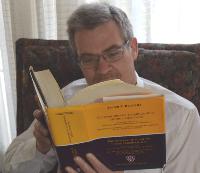| Páginas sobre el tema: [1 2] > | Poll: How much of the source text do you read before starting to translate? Autor de la hebra: ProZ.com Staff
|
|---|
This forum topic is for the discussion of the poll question "How much of the source text do you read before starting to translate?".
This poll was originally submitted by patyjs
View the poll here
A forum topic will appear each time a new poll is run. F... See more This forum topic is for the discussion of the poll question "How much of the source text do you read before starting to translate?".
This poll was originally submitted by patyjs
View the poll here
A forum topic will appear each time a new poll is run. For more information, see: http://proz.com/topic/33629 ▲ Collapse
| | | |
When translating literature, I read the whole book first. When I translate other texts, I scan-read them.
| | | | | The theory and the practice | Mar 7, 2008 |
First there is the theory of how to go about this, and then there is the practice (and of course there is also the version of things that you admit to publicly....)
| | | | | Delivery times | Mar 7, 2008 |
Do delivery times allow us to read the material before translating?
I don't think so, at least in most of my projects.
| | |
|
|
|
what the source text is.
A good few of mine are so predictable that there is really no point in reading it at all beforehand. For a new subject or type of document, it may be necessary to read some or all of it before starting work.
| | | |
I do tend to scan my texts, some more quickly than others before I start to translate so that I have an idea of the language and terminology I'll meet. I read short source texts though.
| | | | Henry Hinds 
Estados Unidos
Local time: 01:02
inglés al español
+ ...
In Memoriam | Good Observation | Mar 7, 2008 |
Aceavila says:
First there is the theory of how to go about this, and then there is the practice (and of course there is also the version of things that you admit to publicly....)
The theory is that one should read it first. The practice is that most people probably do no more than scan.
I will admit publicly that I do not read anything first, I do not even scan. I just start at the beginning and work through to the end. Why waste time?
| | | | | Scan most of it | Mar 7, 2008 |
And occasionally tick some words or ambiguous sentences(to me). In this way, I can get quite a good picture of the content, set the direction and keep a consistent terminology in advance, not having to look up while I am on it.
I personally find reading beforehand helpful to reducing possible mistakes during translation work.
| | |
|
|
|
I admit it publicly too
Actually, I sometimes do scan the text a bit, but really a little little bit, so I did not chose the answer scan because I understood that in this poll, scan was meant to be more reading than one ou two paragraphs. For customers I know, I know what to expect so I don't read anything at all. For new customers, I scan the text very quickly.
| | | | neilmac
España
Local time: 09:02
español al inglés
+ ...
| I'm more or less with Henry on this one | Mar 7, 2008 |
I may sometimes have a quick scan/glance at the text but since most of my work is pretty samey, like Hilde I don't usually need to.
The problem I'm struggling with at the moment is like trying to make a silk purse out of a sow's ear, looking for synonyms for mind-numbingly repetitive political verbiage to try to make it readable... so the reading/re-reading is more in the final stages... (but as the man said, you can't polish a t**d ...!)
| | | |
Meaning you accept texts blindly?
A quick scan normally suffices, but I insist in seeing a text before accepting a job, never mind starting it.
| | | | | Good to find myself in such fine company! | Mar 7, 2008 |
Because of course I too should admit publicly that I rarely do more than glance through a text before attacking (and often not even before accepting). Recently I accepted a text (albeit from a client whom I work with habitually) without discovering beforehand that it wasn't in any of my languages. AND it sat in my in-tray for several days before I opened it and found this out.
That said, since I've started using ProZ I am just a tiny bit less of a sinner, since it's worth finding wh... See more Because of course I too should admit publicly that I rarely do more than glance through a text before attacking (and often not even before accepting). Recently I accepted a text (albeit from a client whom I work with habitually) without discovering beforehand that it wasn't in any of my languages. AND it sat in my in-tray for several days before I opened it and found this out.
That said, since I've started using ProZ I am just a tiny bit less of a sinner, since it's worth finding what terms you want to post for consultation a couple of days at least before your deadline!
[Edited at 2008-03-07 18:52] ▲ Collapse
| | |
|
|
|
Erzsébet Czopyk 
Hungría
Local time: 09:02
Miembro 2006
ruso al húngaro
+ ...
LOCALIZADOR DEL SITIO | delivery deadlines | Mar 7, 2008 |
Francisco Rocha wrote:
Do delivery times allow us to read the material before translating?
I don't think so, at least in most of my projects.
At the real beginning of the New Year I had a special promise: never telling a price without seeing the text, and never accept what the customer says on the phone.
If the customer says "short text" - it means minimum 3 full pages - immediately.
If the customer says, the source text in MS Word format, you can be sure - you will get a PDF.
Finally, I figurate a brand new slogan:
"Do you know what is the difference between the good doctor and the good translator? Nothing.
Neither should I tell the diagnose (price and time required to translate the text) without seeing my client (the text)?"
Reading the source text, we have no more than 15-20 minutes tell the final price, calculate all additional expenses (DTP, etc.)...if not, the business is flying over ;-(((
[Módosítva: 2008-03-07 19:39]
| | | | nke
Local time: 08:02
inglés al gujarati
+ ...
| Generally I do read it all before quoting or begining translation | Mar 7, 2008 |
In my early days, I used to fall upon the material just after a quick scan in my hurry to ensure I met deadlines, but soon found out it works better if if I know what it is all about, as it help to keep terminology consistent. When translating from Hindi and Gujarati into English, often, especially in the spoken form, the words tend to be rather vague, and sometimes, the context or explanation comes right towards the end and one has to go back to each time the word was used to ensure using the ... See more In my early days, I used to fall upon the material just after a quick scan in my hurry to ensure I met deadlines, but soon found out it works better if if I know what it is all about, as it help to keep terminology consistent. When translating from Hindi and Gujarati into English, often, especially in the spoken form, the words tend to be rather vague, and sometimes, the context or explanation comes right towards the end and one has to go back to each time the word was used to ensure using the correct term in each context. It is much more time saving in the end to know exactly what is what right from the begining.
Also, it is important to know what you are taking on, as sometimes clients unknowingly or knowingly pass on techincally legal work as 'general' where the first page/pages might be 'general' and all the legalities follow later! Makes a huge difference in the time and labour one needs to put in.
Of course, in the countless minor translations of the kind that one has done umpteen times, it is not so necessary to read all of the material beforehand. But especially when dealing with new or varied material such as documentary transciptions and interviews and specialist information, legal and medical texts, it is much better to read it through before begining to work on it.
Nirupama
[Edited at 2008-03-08 13:55]
[Edited at 2008-03-08 13:55] ▲ Collapse
| | | | Reed James
Chile
Local time: 05:02
Miembro 2005
español al inglés
| More a matter of becoming than reading | Mar 8, 2008 |
Preparing for translations reminds me of Ray Bradbury's book Fahrenheit 451 where some of the characters memorized whole books before they were tossed into the fire (This, unfortunately, was not the plight of the books removed from Don Quijote's personal library.) In a way, you could say that these people became the books that they read.
I strive to anticipate, to preclude, indeed to foresee the ... See more Preparing for translations reminds me of Ray Bradbury's book Fahrenheit 451 where some of the characters memorized whole books before they were tossed into the fire (This, unfortunately, was not the plight of the books removed from Don Quijote's personal library.) In a way, you could say that these people became the books that they read.
I strive to anticipate, to preclude, indeed to foresee the texts I translate. I achieve this by having translated several texts of the same subject and wording as well as studying many of the subjects that dance upon my computer screen. I do this by keeping my ears and eyes wide open in both languages. I also make a point of choosing a particular subject, say, divorce law, and reading up on it for three months or so. Then I move on to another subject. This keeps my skills sharpened. ▲ Collapse
| | | | | Páginas sobre el tema: [1 2] > | To report site rules violations or get help, contact a site moderator: You can also contact site staff by submitting a support request » Poll: How much of the source text do you read before starting to translate? | Anycount & Translation Office 3000 | Translation Office 3000
Translation Office 3000 is an advanced accounting tool for freelance translators and small agencies. TO3000 easily and seamlessly integrates with the business life of professional freelance translators.
More info » |
| | TM-Town | Manage your TMs and Terms ... and boost your translation business
Are you ready for something fresh in the industry? TM-Town is a unique new site for you -- the freelance translator -- to store, manage and share translation memories (TMs) and glossaries...and potentially meet new clients on the basis of your prior work.
More info » |
|
| | | | X Sign in to your ProZ.com account... | | | | | |
















